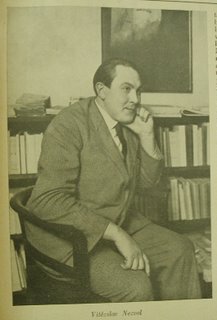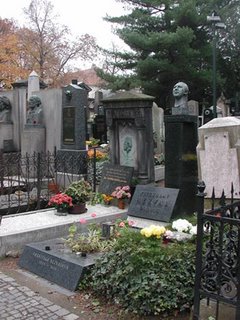More About Nezval

The poet Vítězslav Nezval currently takes up a good share of my day (and sometimes night). Yet few of my readers will have the faintest idea who he was, as he is not really, to my knowledge, translated into English.
Nezval was one of those dazzling, ultra-prolific figures of First Republic Czechoslovak culture. Originally from Moravia, he came to Prague in his early youth and became a member of the Devětsil group, which proved to be the major 1920s Czech avant-garde group to belong to if you were a rising artist, writer, architect, director, composer, or whatever. By the early 1930s, when Devětsil was no longer really in one piece, Nezval and some of the other Devětsil members were becoming increasingly interested in surrealism. In 1933, Nezval wrote to André Breton regarding “concrete collaboration,” after which he and the director Jindřich Honzl visited Paris and (as I have noted before) met up with Breton. Thus, what I have been reading about lately in Nezval’s diaries is his rather frenetic activity during early 1934, when he and others were busy forming the Prague surrealist group and getting the word out to the rest of the avant-garde and leftist community. Eleven people signed the original pronouncement, but as far as I can tell, of these only Nezval, Honzl, Štyrský, Toyen, Brouk, and Ježek, plus to some degree Biebl, were really active in forming the group. Karel Teige, who joined the group somewhat later, was also involved in the discussions, as were, to some extent, Roman Jakobson and Jan Mukařovský. It appears that the journalist Julius Fučík, now best known for being a Communist martyr during World War II (he used to have a metro station named after him, but no more), played the role of devil’s advocate. I get the impression that Fučík sided with Ilya Ehrenburg, who asserted in 1933 that the French surrealists’ real program was not Marxism but “masturbation, pederasty, fetishism, exhibitionism and, finally, bestiality.”
(And now that I have attracted an entirely new readership to this blog by the inclusion of the above words…)
I will not at the moment go into great detail about the early years of Czech surrealism, because here I am merely introducing Nezval. Suffice it to say that judging by Nezval’s diary, he had reason to think of himself (as indeed he did) as the founder of the Prague surrealist group. Of course, if diaries by Honzl, Štyrský, or Brouk (to name the three likeliest suspects, as they all wrote copiously) were to pop up, we might get a different impression. But Nezval was certainly enamored of surrealism during most of the 1930s, and unquestionably put a lot of effort into the matter. Then, in 1938, he had disagreements with the other most active members regarding Stalin and Stalinism, and tried to disband the group but was repudiated by those who chose to continue as a non-Stalinist group.

Since my area of research is Toyen and surrealism rather than Nezval, I can’t say much about his life subsequent to surrealism, but he did write odes to Stalin, which I gather are not very good literature in addition to being ideologically distasteful. From what I can tell, Nezval’s most interesting and exciting work was produced in the twenties and thirties, when he produced vast amounts of poetry, quite a few novels, various plays and screenplays, art criticism, lectures, manifestos, and even horoscopes. (For those who know their film history, Nezval worked on Ecstasy, which stars Hedy Lamar.) Nezval was also a composer and occasional artist, but I don’t think he is particularly renowned in these fields.

0 Comments:
Post a Comment
<< Home